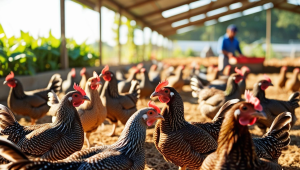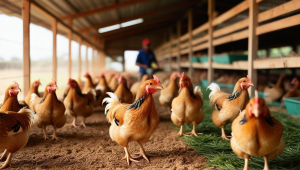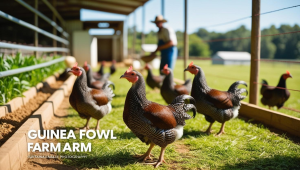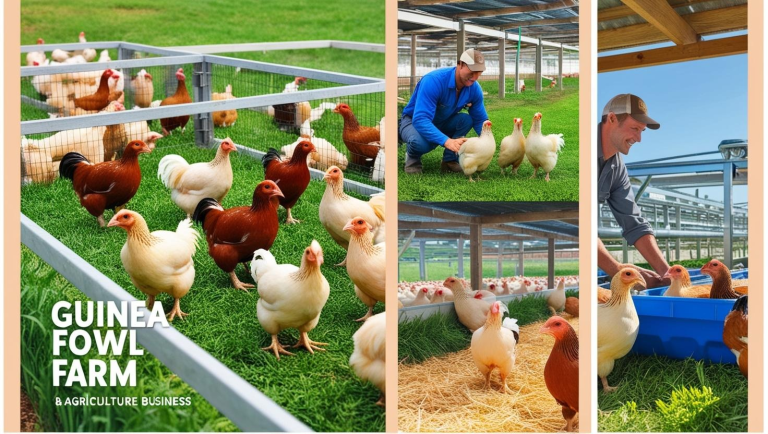Guinea fowl farming is gaining popularity as a lucrative poultry enterprise due to its numerous benefits, including its hardy nature, high resistance to diseases, and its ability to thrive in free-range systems. These birds are valued for their meat, eggs, and their ability to control pests in agricultural settings. Compared to chickens, guinea fowls require minimal input while offering substantial returns, making them an excellent option for both small-scale and commercial farmers.
This article provides a detailed insight into guinea fowl farming, covering aspects such as breeds, housing, feeding, breeding, health management, and marketing to help farmers maximize profitability.
Click HERE to join our WhatsApp group
Why Invest in Guinea Fowl Farming?
Guinea fowl farming presents multiple advantages, including:
Hardiness: They are more resistant to diseases compared to chickens.
Low Maintenance: Require minimal feed supplementation, especially in free-range systems.
High-Quality Meat: Leaner, richer in protein, and considered a delicacy in many markets.
Egg Production: Guinea fowl eggs are nutritious and have a longer shelf life than chicken eggs.
Pest Control: Known for consuming insects, ticks, and other agricultural pests.
Security Benefits: Their loud calls act as an alarm system against intruders and predators.
READ ALSO: Beef Cattle Farming: Breeds, Housing, and Management
Common Guinea Fowl Breeds

Several breeds of guinea fowl are suitable for farming, including:
Helmeted Guinea Fowl (Numida meleagris): The most common breed, with a distinctive bony casque on its head.
White Guinea Fowl: Similar to the helmeted breed but with entirely white feathers.
Lavender Guinea Fowl: Light gray with a bluish tinge, popular in ornamental farming.
Pearl Guinea Fowl: Dark gray with white spots, one of the most common varieties in commercial farming.
Royal Purple Guinea Fowl: A deep, dark purple color, popular for both meat and aesthetics.
Selecting the right breed depends on farming goals, whether for meat, egg production, or pest control.
Housing Requirements for Guinea Fowl
READ ALSO: Mastitis in Dairy Cattle: Prevention and Treatment
Although guinea fowls can adapt well to free-range farming, proper housing ensures their safety and productivity. Consider the following when setting up housing:
Spacious Coop: Guinea fowls are active birds and require a coop with at least 2-3 square feet per bird.
Ventilation: Proper airflow prevents respiratory diseases.
Perches and Roosting Areas: Guinea fowls prefer to roost high at night.
Nesting Boxes: Provide enclosed areas with straw or hay for egg-laying.
Fencing: Since they tend to wander, fencing prevents them from straying too far.
Security: Protect against predators like foxes, snakes, and hawks.
Feeding and Nutrition

Guinea fowls are omnivorous and thrive on a variety of feeds. A balanced diet includes:
a) Starter Diet (0-6 weeks)
Protein: 24-26% (chick starter feed or game bird starter feed)
Minerals & Vitamins: Essential for strong growth and immunity.
b) Grower Diet (6-16 weeks)
Protein: 18-20% (grower mash or crumbles)
Grains: Millet, sorghum, and maize.
c) Adult Diet (16 weeks and above)
Protein: 16-18%
Greens & Foraging: Grass, weeds, vegetables, and insects.
Calcium Sources: Crushed eggshells or oyster shells to support egg production.
Water should always be clean and readily available to prevent dehydration.
READ ALSO: Dairy Farming: Best Practices for High Milk Yield
Breeding and Egg Production
Guinea fowls are seasonal layers, producing eggs mostly in warm months.
Laying Cycle: Hens begin laying at 6-7 months of age, producing 80-150 eggs per year.
Nesting Habits: Prefer to lay eggs in hidden nests; providing artificial nesting areas can improve collection rates.
Incubation: Guinea fowl eggs take 26-28 days to hatch. Hatching can be done naturally (by hens) or in incubators.
Brooding: Guinea keets (chicks) require warm temperatures and should be raised under a heat source for the first 6 weeks.
Common Diseases and Health Management

Guinea fowls are resistant to most poultry diseases but can be affected by:
Newcastle Disease: Causes respiratory issues; vaccination is recommended.
Fowl Pox: A viral infection leading to scab-like lesions.
Coccidiosis: Causes diarrhea; can be controlled with proper hygiene and medicated feed.
Worm Infestation: Deworming every 3-4 months helps prevent digestive issues.
Marek’s Disease: Affects the nervous system; vaccination is advised.
Preventive Measures:
Regular deworming and vaccinations.
Clean and disinfect coops regularly.
Isolate sick birds immediately.
Provide proper nutrition to boost immunity.
READ ALSO: Behaviour differences linked to broiler growth rates
Marketing and Profitability
To make guinea fowl farming profitable, farmers should explore various market opportunities.
a) Selling Guinea Fowl Meat
Considered a delicacy in many cultures.
High demand in restaurants, hotels, and supermarkets.
Organic and free-range meat fetches premium prices.
b) Selling Guinea Fowl Eggs
Eggs have a longer shelf life than chicken eggs.
Market to specialty stores, farmers’ markets, and organic food consumers.
c) Selling Live Birds
Backyard poultry keepers and hobby farmers often buy live guinea fowls.
Fertile eggs can also be sold to breeders.
d) Pest Control Services
Guinea fowls help control ticks and insects; farms and vineyards use them as natural pest control.
Profitability Tip: Diversifying revenue streams by selling meat, eggs, live birds, and offering pest control services enhances earnings.
Challenges in Guinea Fowl Farming
Flighty Nature: Unlike chickens, guinea fowls prefer to roam.
Low Brooding Instincts: Hens do not readily incubate their eggs.
Noisy Behavior: Their loud calls can be a nuisance in urban areas.
Predation Risks: Free-range birds are vulnerable to predators.
Solutions:
Train birds to return to coops at night.
Use incubators for better hatching rates.
Fence farming areas to minimize losses.
Conclusion
Guinea fowl farming is a profitable venture with multiple benefits, including high-quality meat, nutritious eggs, and natural pest control. With proper management, adequate nutrition, and good marketing strategies, farmers can maximize their returns from this enterprise. Whether for small-scale or commercial purposes, investing in guinea fowl farming is a promising opportunity in the poultry industry.
READ ALSO: Housing and Management Systems for Livestock and Poultry
Proper housing and management systems are crucial for ensuring the health, comfort, and productivity of livestock and poultry. Well-designed housing provides protection from harsh weather, predators, and diseases, while effective management practices ensure efficient production and profitability…
READ ALSO: Stress Management in Livestock
Stress in livestock is a significant concern for farmers and animal welfare experts. Stress can negatively impact growth, reproduction, immunity, and overall productivity. It can be caused by various factors, including environmental conditions, handling practices, nutrition, and diseases…
Click HERE to join our WhatsApp group

